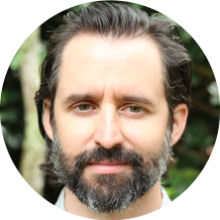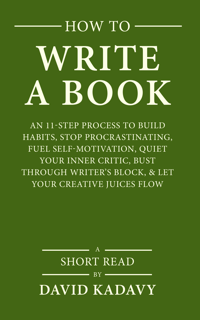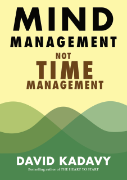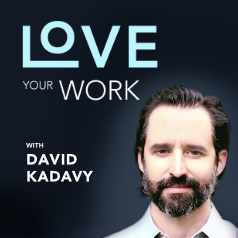Subscribe to blog updates via email »
How Matthew Walker Ruined My Sleep (& How I Fixed It) – Love Your Work, Episode 276
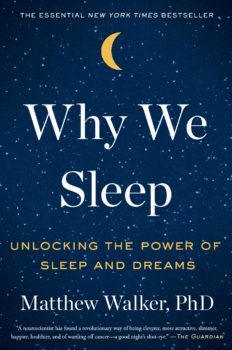 In 2018, Matthew Walker was on a media blitz, promoting his book, Why We Sleep. I was one of the many people who picked up the book. It slowly ruined my sleep. But recently, I fixed it.
In 2018, Matthew Walker was on a media blitz, promoting his book, Why We Sleep. I was one of the many people who picked up the book. It slowly ruined my sleep. But recently, I fixed it. Listen to the Podcast
- Listen in iTunes >>
- Download as an MP3 by right-clicking here and choosing “save as.”
- RSS feed for Love Your Work
No, this is not a takedown
Before I go further, this is not a “takedown” of Why We Sleep, like the one that’s been floating around. I’ve read that takedown, and I didn’t find it convincing. I trust that Why We Sleep is mostly full of accurate information. I say “mostly,” because I understand Walker has been on a mission to elevate the importance of sleep. Sometimes you have to say something like “the shorter you sleep the shorter your life span,” for a sleep-deprived public to get the point, when, technically, research shows people who sleep longer than the recommended 7–9 hours live shorter lives. It’s called rhetoric. When FDR said “we have nothing to fear but fear itself,” thankfully there weren’t blogs to write pedantic takedowns of his logic. My complaints about Why We Sleep don’t involve ill intentions. I’m sure Walker wants people to get more sleep. But I don’t think the book has the effect he expected.Why Why We Sleep will scare the sleep out of you
In Why We Sleep, Matthew Walker, PhD says if you don’t sleep enough, you are at risk of the following:- Obesity
- Cancer
- Dementia
- Alzheimer’s
- Heart disease
- Depression
- Anxiety
- Diabetes
- Car crashes
- Lower income
- Low sperm count
- Deformed sperm
- Female infertility
- Not being able to jump as high
- Longer workout recovery
- Vulnerability to colds and flus (today, that also means COVID)
- Low testosterone
- Smaller testicles
I was doing everything right
After reading Why We Sleep, I, like many people, decided I was going to take sleep more seriously. But, as a creative with an interest in the neuroscience of creativity, I had already been taking sleep pretty seriously. I already slept with earplugs and a mask. I already avoided screens before bedtime, and had for years worn blue-light-blocking goggles before bed. I already didn’t read or watch TV in bed, and didn’t allow electronics in my bedroom. I already didn’t consume caffeine and rarely drank alcohol. I already lived a low-stress lifestyle with plenty of exercise and friends. I didn’t and don’t have kids that wake me up in the middle of the night. I already had a bedtime, and a nighttime routine, like I talked about on episode 259.I tried to do it right-er
I was doing everything right. Where I went wrong was trying to follow Walker’s recommendation of 7–9 hours of sleep per night. The way I went about that: Stay in bed until I got eight hours of sleep. At first, it wasn’t a big deal. I would occasionally wake up much earlier than I had intended. But I brought to mind a graph from the book, which showed that sleep cycles come in ninety-minute increments.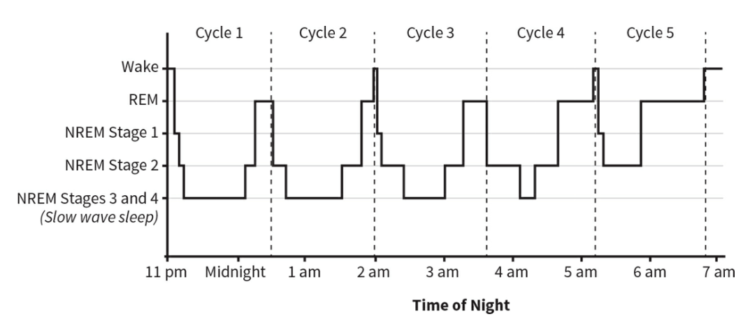
Ninety-minute sleep cycles, from Why We Sleep.
It’s 3 a.m. I must be lonely (and awake)
There are many kinds of insomnia, but they mostly consist of either sleep-onset insomnia or early-morning insomnia. I didn’t and still don’t have much trouble falling asleep (thanks to my nighttime routine). My problem was, waking up way too early. Not 5 a.m., but 3 a.m., and I was awake. My thoughts were racing, my heart was pounding, and I could not get back to sleep. I shared this problem with a number of friends. It turns out a lot of people have this problem. But multiple friends told me, “Matthew Walker’s book ruined my sleep.” Then, they all happened to recommend the same book to me, which had fixed their sleep.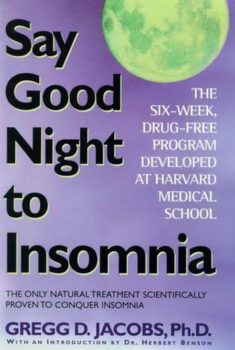
Enter Say Goodnight to Insomnia
Why We Sleep takes the approach of telling you sleep is so important, if you don’t do it you’ll die. The book, Say Goodnight to Insomnia takes the opposite perspective. It essentially tells you, not to worry about sleep. Here’s some things it actually tells you:- You can function fine without enough sleep.
- As long as you’re, in the long run, getting at least 5.5 hours of sleep a night, you’re fine.
- If you feel bad after a night of poor sleep, you’re probably blaming the effects on poor sleep, when they might be caused by something else – such as stress, nutrition, or normal variations.
- Insomniacs generally get only a couple hours less sleep than normal people, and don’t perform any less well.
- Your body compensates for a poor night of sleep by sleeping better the following night.
- People often mistake light, Stage 2 sleep, as wakefulness. So even when you think you’re not sleeping, you might be!
Hours-sleep recommendations are arbitrary
Did I just say Matthew Walker’s sleep recommendations are arbitrary? Well, they kind of are. Here’s why: For one, there’s a difference between self-reported sleep, and actual sleep (in fairness, this is in the takedown I mentioned earlier). People who say they slept six hours tend to have actually slept five. People who say they’ve slept seven and a half hours, tend to have actually slept seven. Self-reported versus actual sleep duration is all over the board, and the discrepancy varies according to a bunch of factors.We can’t study sleep interventions across populations
This is hard enough to deal with when trying to figure out how much you’ve slept, but when you’re trying to study the effects of sleep, over long periods of time, across entire populations, it’s simply impossible. Researchers have to use self-reports, which are unreliable. And it’s not practical to randomly split up the population into two groups and say, “You people, sleep a ton!,” and “You people, don’t sleep more than five hours a night. Oh, and both of you, do this for life!”So we can’t know how much sleep you need
So while studies show people who get little sleep are at a higher risk of Alzheimer’s Disease, and we can piece together studies to form an explanation of how a lack of sleep might cause Alzheimer’s, we can’t really know if it’s being caused by a voluntary lack of sleep, or if the same thing that causes Alzheimer’s also causes a lack of sleep. Even if we did know, for sure, how much sleep exactly do you need in order to prevent Alzheimer’s? Epidemiological studies covering large populations are self-reported, so we don’t know how much sleep these subjects are actually getting. Yes, that is changing as more people are using personal sleep-tracking devices. But we still can’t force random sections of the population to get more or less sleep, and people who wear these devices are a self-selected group of people. I don’t have one, and don’t want one.Turn negative into positive sleep thoughts
When you worry about not getting enough sleep, you’re having what Say Goodnight to Insomnia author, Gregg D. Jacobs, PhD, calls “Negative Sleep Thoughts,” or NSTs for short. What do you tell yourself when you can’t sleep? Things like, “I won’t be able to function tomorrow,” “I feel terrible because I didn’t sleep well last night,” and “Everyone else has an easy time sleeping.” If you’ve read Matthew Walker’s book, you can add to that, “If I don’t get enough sleep, I’ll get diabetes, cancer, and Alzheimer’s, and won’t be able to jump as high.”Say Goodnight to Insomnia program summary
Here’s the gist of how the Say Goodnight to Insomnia program works. Each chapter ends with a sleep journal. For the first week, you record your baseline patterns: What time did you go to bed, and to sleep? How many times did you wake up, and for how long? How do you rate the quality of your sleep? Each week of the program, Jacobs introduces a new way to assess your sleep, and turn poor sleep habits into better sleep habits. In week one, he introduces you to “cognitive restructuring.” Every time you have a Negative Sleep Thought, you turn it around into a Positive Sleep Thought. So if you think, “I’m sleeping terribly tonight,” you remind yourself that you’re probably sleeping more than you think, and that you’ll sleep better tomorrow if you don’t sleep well today. In week two, he introduces you to the concept of “sleep efficiency,” or the percentage of time that you’re in bed, during which you’re actually sleeping.Sleep restriction therapy
This is also when Jacobs introduces you to “sleep restriction,” which is the main component of the treatment program, and has been found to be incredibly effective for insomnia. Jacobs instructs you to take your baseline average amount of sleep, and add one hour to it. That’s how long you’re allowed to be in bed. For me, I was averaging about six hours of sleep, so, adding an hour to that, I could stay in bed for seven hours. My desired wake-up time was 7 a.m., so that meant I had to stay out of bed until midnight. Midnight has historically been my latest target bedtime, but I was only sleeping six hours a night, so staying up until midnight was crazy hard. It felt impossible. Some nights, I could hardly keep my eyes open at 10:30 p.m. I was reading the same sentence over and over, as I nearly lost my ability to hold my Kindle. I had to get up and pace around, or practice putting, on my hallway rug.Don’t condition yourself to be awake in bed
As you can imagine, by the time I was allowed to go to bed, I didn’t have much trouble falling asleep. I still sometimes woke up in the middle of the night, and so I followed Dr. Jacobs’ advice: If you’re wide awake, don’t toss and turn and frustratingly struggle to sleep. Ideally, you should get out of your bed, and read until you feel tired again. But if you’re tired enough that getting out of bed seems impossible, Dr. Jacobs says it’s okay to sit up in bed while you read, so long as you don’t do so for longer than an hour. So, if I were to boil down the Say Goodnight to Insomnia program into three principles, they would be the following:- Restructure your thoughts around sleep. So, don’t tell yourself horror stories about not being able to sleep. Trust that, with healthy sleep hygiene, your body is capable of letting you know when it needs sleep.
- Keep your sleep efficiency up. Dr. Jacobs recommends that you restrict sleep until you have 85% sleep efficiency for at least two weeks. In other words, 85% of the time you’re in bed, you’re asleep. Only after two weeks at that level can you add fifteen minutes to your time in bed.
- Condition yourself to sleep while in bed. My mistake was that by spending a lot of time in bed, in an effort to get enough sleep, I was spending a lot of time in bed when I was not sleeping. This is extra-harmful if that time you spend not sleeping is spent worrying about how you’re not sleeping enough. Your bed is for only two things, and most of what you should do in bed is sleep.
My results with Say Goodnight to Insomnia
But, in fact, upon reviewing my journal, I realized it was working. After a few weeks, the Say Goodnight to Insomnia program had me waking up in the middle of the night less often, and for shorter periods, and my self-rated sleep quality had increased. By the end of the six week program, my sleep had improved on about every dimension, including sleep quality, sleep efficiency, and average amount of sleep. I will say that naps were a saving grace during this program. During the first couple weeks of sleep restriction, there were some nights where I got less than five hours of sleep. Like the book said, I was still able to function, but mercifully, Dr. Jacobs said it was okay to nap no longer than forty-five minutes, no later than 4 p.m.Say Goodnight to the damage done by Why We Sleep
The intention of Matthew Walker’s book, Why We Sleep is correct – sleep is vitally important. But, how much sleep do you need? Unless you have a sleep disorder – which you should absolutely check for with your doctor – if you’re keeping good sleep hygiene, such as a nighttime routine, and are making sure you sleep efficiently and think positively about your relationship with sleep, as recommended by Dr. Jacobs – what more can you do?Join the Patreon for (new) bonus content!
I've been adding lots of new content to Patreon. Join the Patreon »
Subscribe to Love Your Work
Listen to the Podcast
- Listen in iTunes >>
- Download as an MP3 by right-clicking here and choosing “save as.”
- RSS feed for Love Your Work
Theme music: Dorena “At Sea”, from the album About Everything And More. By Arrangement with Deep Elm Records. Listen on Spotify »
